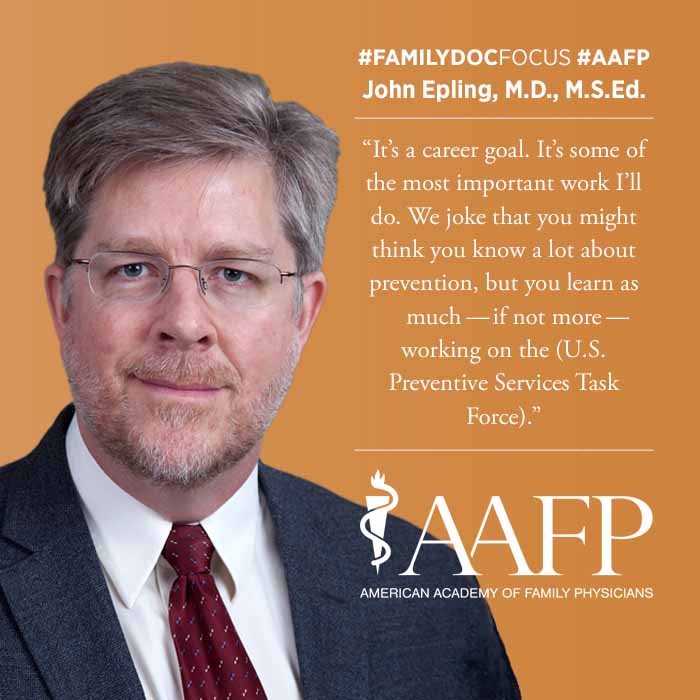Following Evidence Led FP to His Most Important Role
November 11, 2019 11:04 am David Mitchell – As John Epling, M.D., M.S.Ed., was completing his family residency training in the mid-1990s, the push for an evidence-based approach to medicine was gaining momentum and he was determined to learn more.
"There was a lot of thought about basing our clinical decisions on research," said Epling, a professor of family and community medicine, medical director of research and medical director of employee health and wellness in the Department of Family and Community Medicine at Virginia Tech's Carilion School of Medicine in Roanoke. "That was important for me to understand. I had an interest in doing research, so I started with appraising other people's research and learning about how other people did research."
As a Navy physician, Epling spent his first two years post-residency at the U.S. Naval Hospital in Guam.
"I spent a lot of time reading up on evidence-based medicine," he said.
In 1997, Epling returned to the contiguous United States, teaching evidence-based medicine as faculty at the Family Practice Residency at the U.S. Naval Hospital in Jacksonville, Fla. By 2001, he was a clinical assistant professor of family medicine at State University of New York Upstate Medical University in Syracuse when he attended the first convocation of the AAFP's National Network for Family Practice and Primary Care Research (now the National Research Network). At that meeting, he met physicians who had participated in the Ambulatory Sentinel Practice Network.

"I really got my first taste of real primary care research at that conference," said Epling, who also was on the faculty at SUNY Upstate Medical University's Center for Evidence-based Practice in the Department of Family Medicine. "The idea of primary care physicians doing valuable research in practice and getting answers was exciting. These were people who had made careers in ASPN doing groundbreaking research in primary care. I saw that possibility and wanted to be involved.
Nearly two decades later, Epling has written or contributed to nine books, roughly 90 journal articles and nearly two dozen technical reports for the Department of Defense.
In 2011-12, he served as one of the AAFP's Vaccine Science Fellows. That experience, he said, included attending meetings of the CDC's Advisory Committee on Immunization Practices, the National Vaccine Advisory Committee and state-level immunization meetings.
"I learned a tremendous amount," said Epling, who now serves as the AAFP's liaison to the ACIP workgroup on adult immunizations. "It was an introduction to the guideline process and policymaking."
That proved important for Epling, who now serves as one of four family physicians on the U.S. Preventive Services Task Force, along with vice chair Alex Krist, M.D., M.P.H.; Chyke Doubeni, M.D., M.P.H.; and Chien-Wen Tseng, M.D., M.P.H., M.S.E.E.
For Epling, the work represents the intersection of his major interests -- evidence-based medicine, prevention and public health.
"It's a career goal," said Epling, who still sees patients, precepts medical students and works with residents. "It's some of the most important work I'll do. We joke that you might think you know a lot about prevention, but you learn as much -- if not more -- working on the task force."
The USPSTF is an independent panel of experts in primary care and prevention appointed by the Agency for Healthcare Research and Quality. It systematically reviews the evidence of effectiveness for various treatments and develops recommendations.
"There's a lot of great discussion and pushing each other in positive ways," Epling said. "You have a group of family physicians, OB/GYNs, pediatricians, mental health professionals and nurses, but the focus is on what it means for patients. We make recommendations for individual physicians who are making recommendations to their individual patients. It's nice to see everyone on board for that mission. There is collaboration across the specialties."